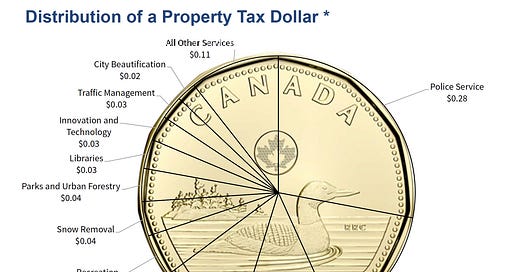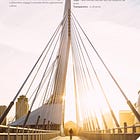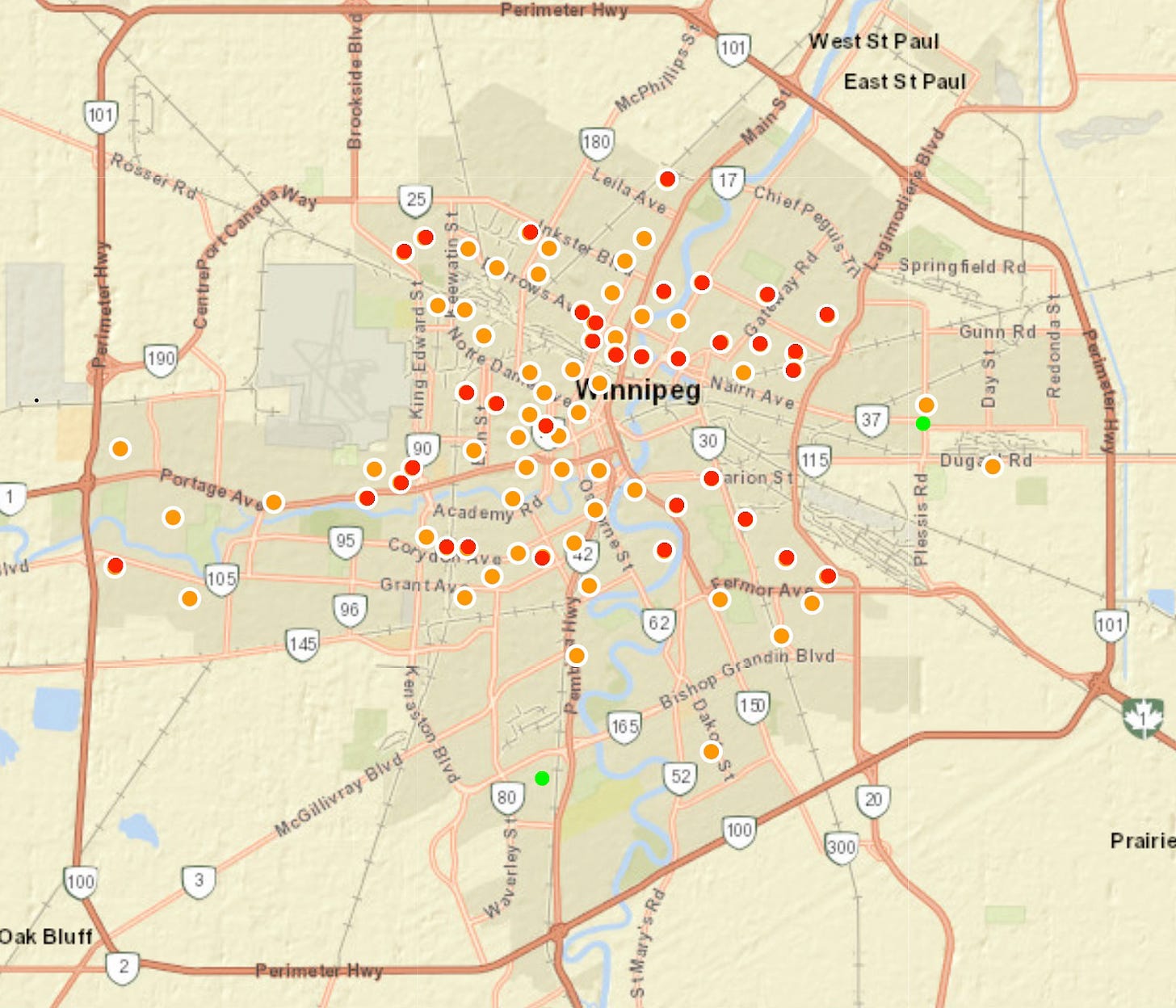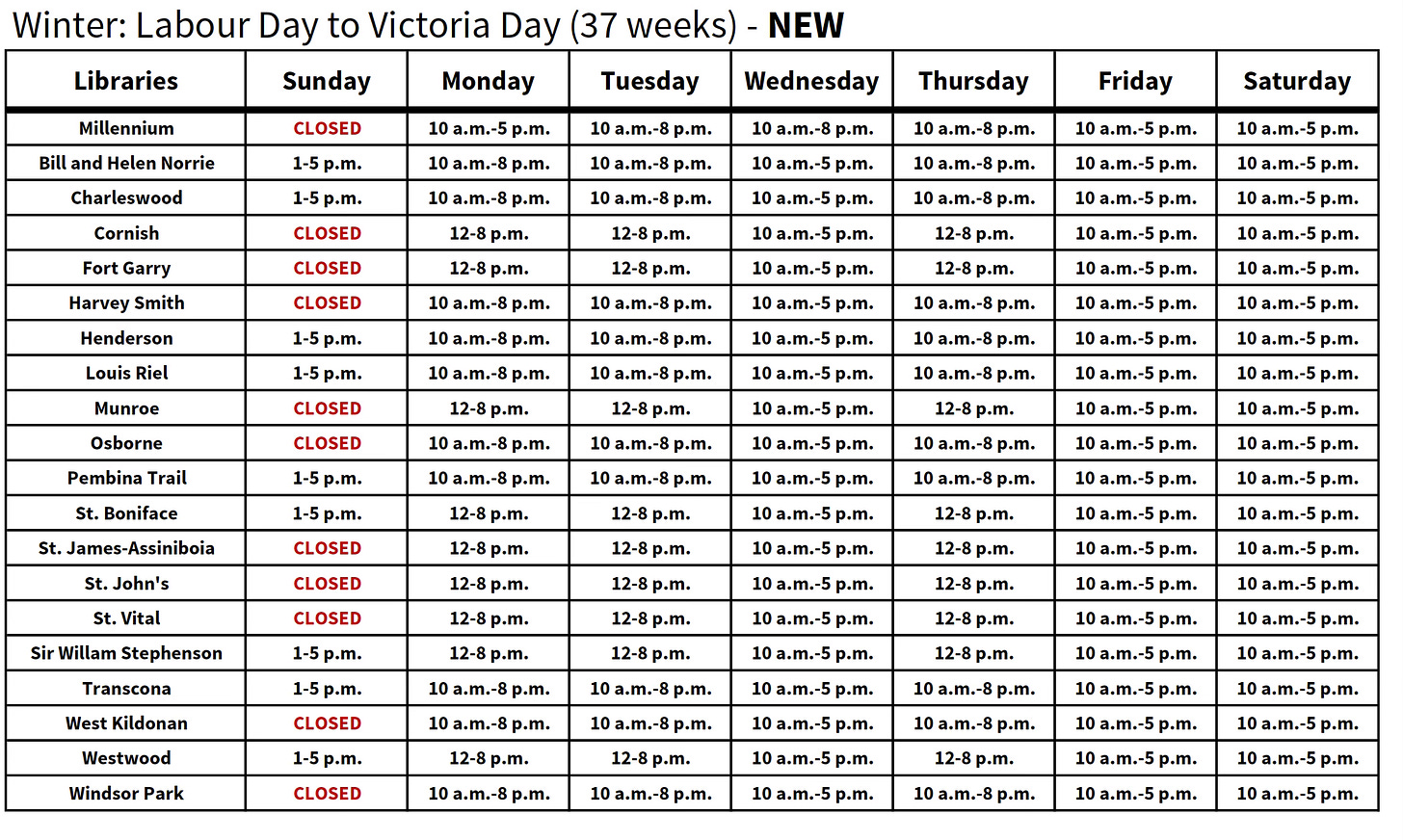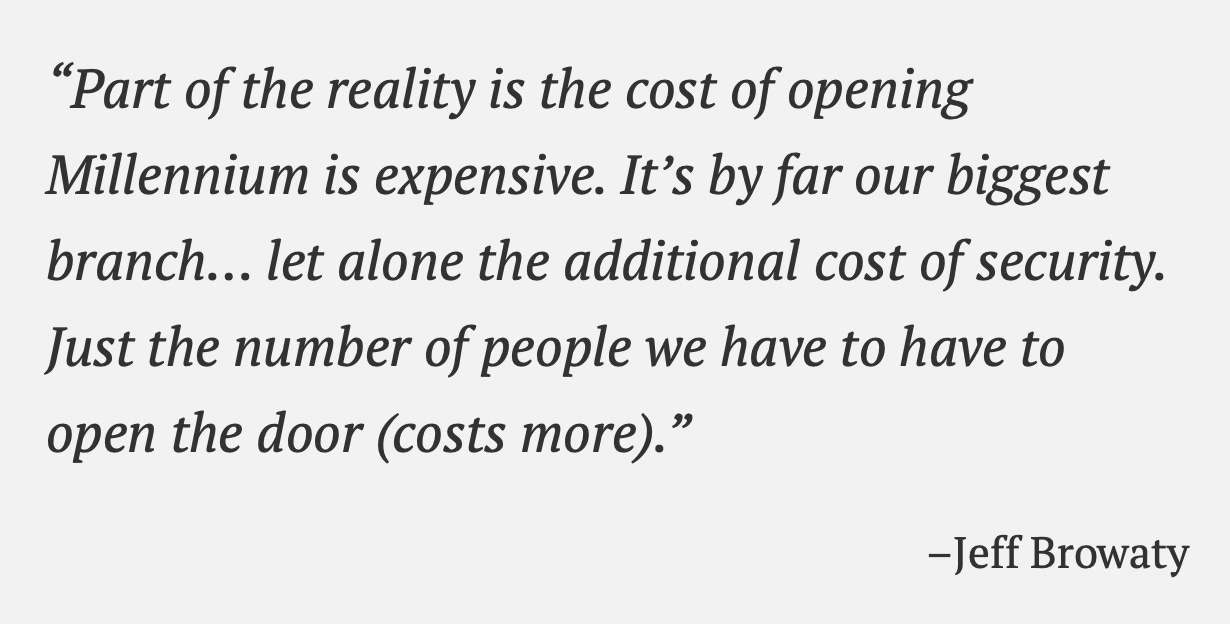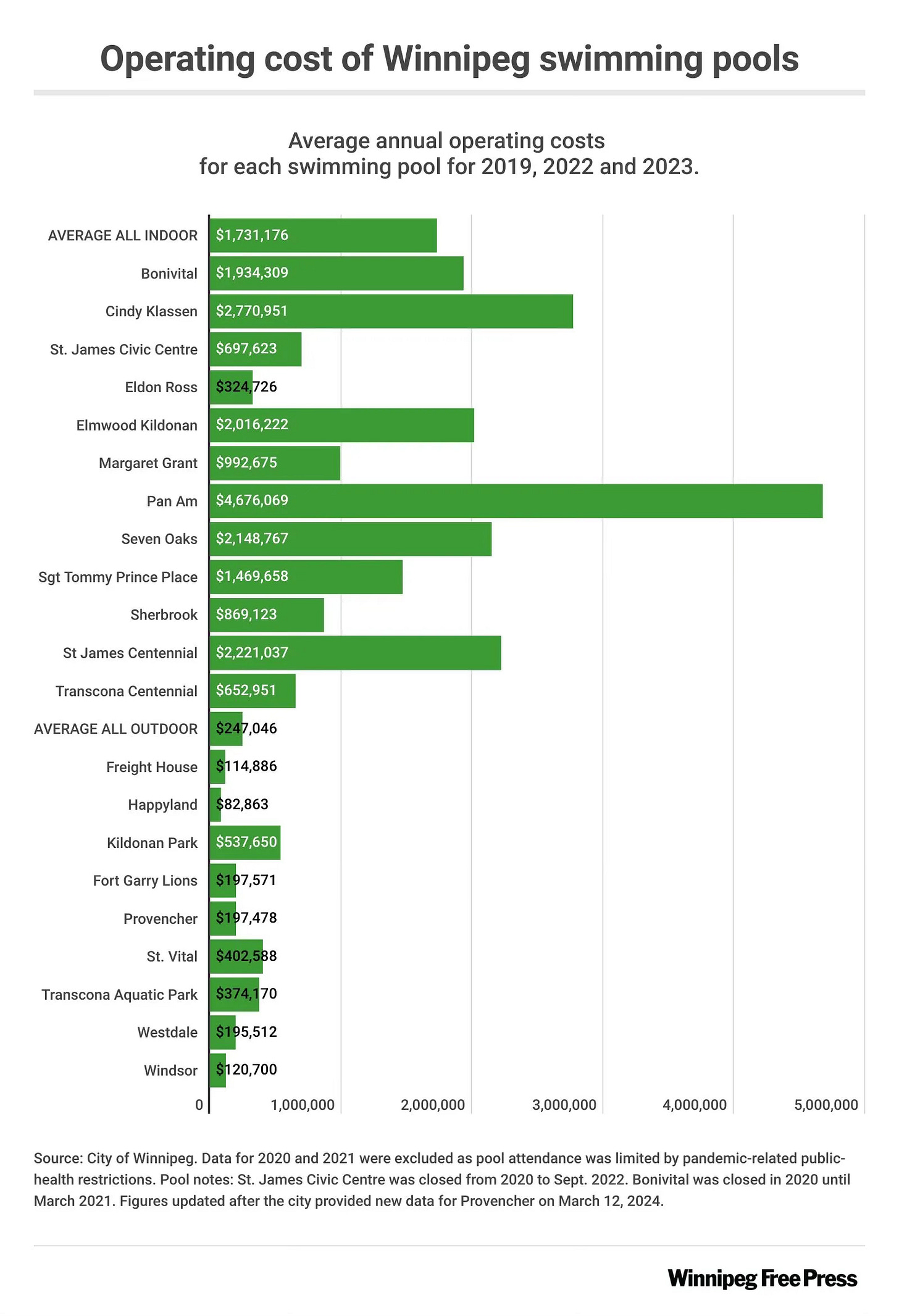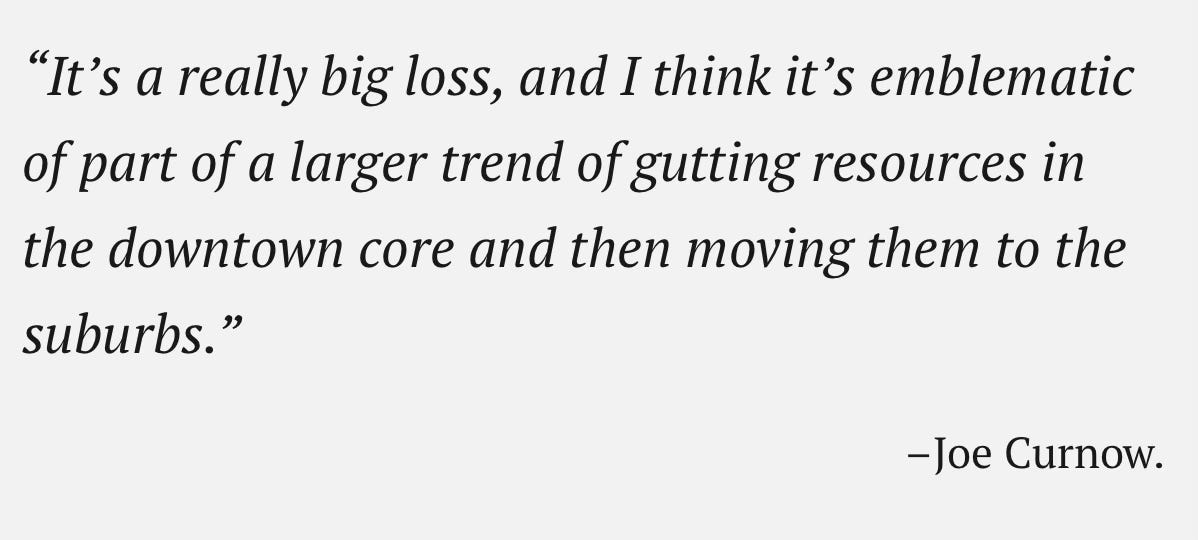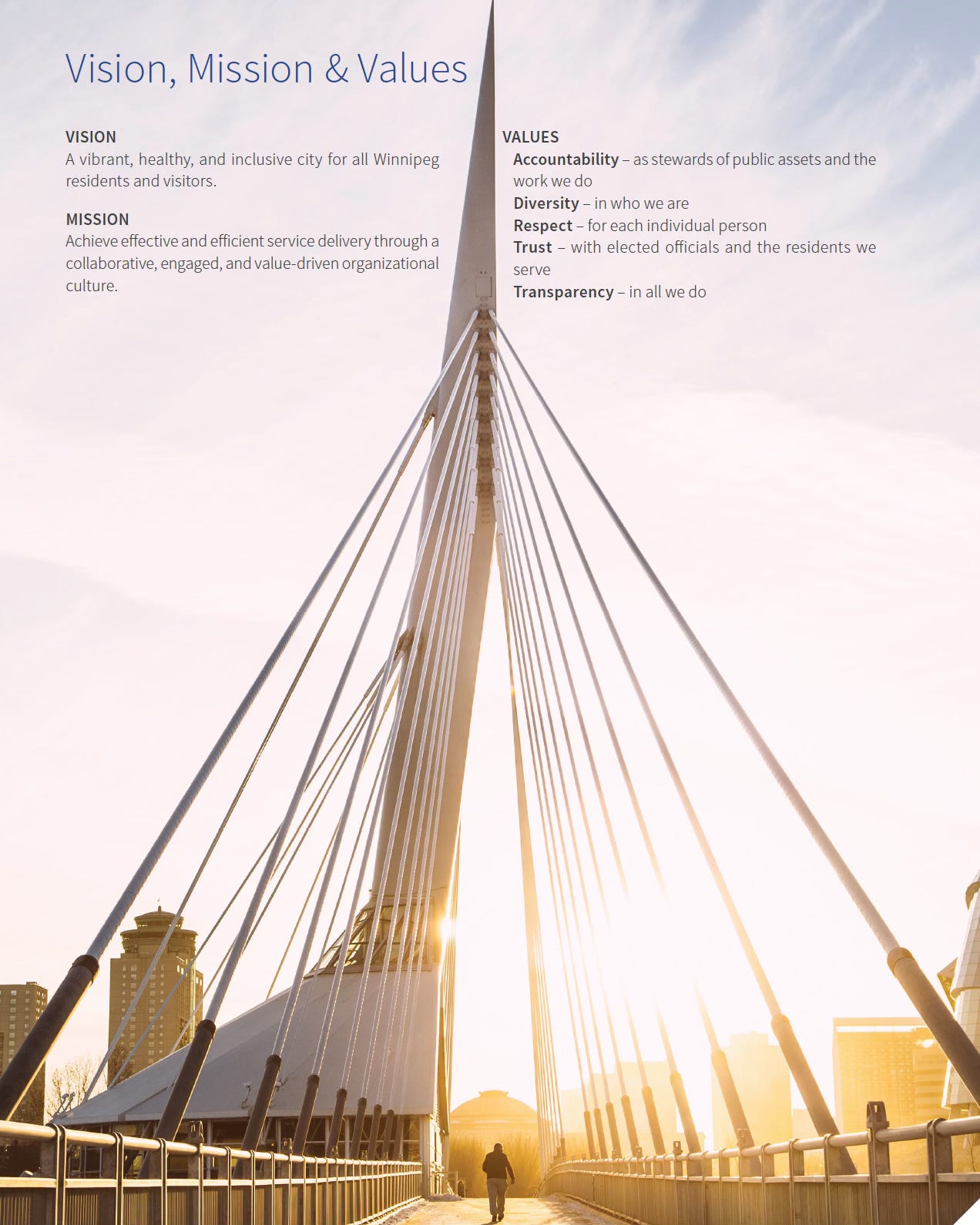Winnipeg Budget's Winners and Losers (Part 2)
Part 1 looked at the shift in the revenue, Part 2 looks at the expenditures
The 2024-2027 Winnipeg budget came out in February and is due to be approved by City Council on March 20th. It’s worth having a look at it to see what it shows us about Council’s vision for the city, and where they think the priorities are for the next 4 years.
In Part 1 we looked at the winners and losers in the budget from the perspective of who is paying for city services and how. The shift towards a greater reliance on user fees is expanding inequities within the city. This trend has been going on for a while and seems destined to continue.
But it isn’t just in how the city collects revenue, property taxes and user fees, that identifies winners and losers. It is how and where services are delivered that are just as important, if not more so.
Just as with property taxes, the winners, right across the board, are home owners in the suburbs while the losers are renters in established neighbourhoods. When it comes to user fees, as we saw previously, the impact on lower income Winnipeggers is substantially greater than on more affluent residents. Those with lower incomes tend to live in older established areas, and are more reliant on public services such as transit, public recreation facilities, public parks, and library services. When those services are reduced, they are affected to a much greater degree.
The Trade Offs
Budget are balancing acts. Because municipalities are not allowed to run a deficit, unlike other orders of government, they must have a balanced budget each and every year. As we have seen for over 25 years in Winnipeg, revenue in the form of property taxes and other fees has not kept up with the increased costs of operating the city. This pattern is continuing in the 2024-2027 budget.
That has left the city no other choice but to decrease services, both in quantity and quality. We see the results of 25 years of austerity every day across Winnipeg. The loss of trees, the reduced library hours, decreases in recreation services, cutting funding to social services, the elimination of public art, and the crumbling sidewalk are all the result of Winnipeg’s slide to the lowest taxed large municipality in the country.
Over the next four years, that reduction in services is going to continue, but, as in the case of user fees, it is going to impact some residents more than others. The reduction in recreation and libraries is going to affect residents in the inner city far more than others, and this is the area that has already been subjected to 25 years of under funding and neglect.
So let’s look at a couple of areas that are specifically targeted in the 2024-2027 budget. These are areas that have elicited a lot of public response since the release of the budget, and affect one specific segment of residents to a greater degree.
Pool Closures
The budget sets out to close 3 swimming pools and 20 wading pools. These are apparently going to be offset by 10 new splash pads across the city. At the same time, there is capital investment towards new recreation facilities south Winnipeg and in Transcona.
CBC: Budget to close several pools
Existing wading pools and swimming pools are, almost by definition, in older established neighbourhoods. They have been around for a while and are getting older. Below is a map showing the existing wading pools in Winnipeg, with those slated for closure in red. with new facilities in green.
Library Hours
The budget is allocating more funding for libraries. This is a positive development as Winnipeg libraries have been underfunded for a long time. As a result, we have seen reduced hours across the system and understaffed branches. Any increase in funding is a good thing.
CBC: Expansions to Winnipeg Library Hours
But (isn’t there always a but!!), while there is an increase in library funding for more staff, hours, and a new library in north west Winnipeg, the increases in service are not across the board. The flagship Millennium Library will see reduced hours in the summer and will be closed altogether on Sundays in the fall/winter/spring.
New Library Hours
263KB ∙ PDF file
Full listing of current and proposed library hours
Why these choices?
The closure of pools and reduction of library hours in the inner city and established neighbourhoods are a choice. The rationale for that choice can seem arbitrary and inconsistent. In explaining the reduction of hours for Millennium Library, Councillor Browaty, Chair of the Finance Committee, indicated that Millennium was more expensive to operate:
Whereas, the closure of the pools doesn’t seem to be tied to the operating costs. The three swimming pools slated for closure are Eldon Ross, Happyland, and Windsor Park. As we see below those three pools are among the cheapest to operate in the city.
The closing of 3 swimming pools, decommissioning of 20 wading pools, and reduction of hours of the largest and downtown library all impact established neighbourhoods to a disproportionate extent. The reduction of city services in these communities further exacerbates already existing and prominent inequities within Winnipeg.
Winners?
I’ve framed this as identifying winners and losers in the City of Winnipeg budget. Higher user fees and decreased services impacts less affluent and less car dependent inner city neighbourhoods to a greater extent. In the balancing act that is any budget, these residents and neighbourhoods are on the losing side of the ledger.
Frankly, there is nothing new in this. This is the result of years of neglect and putting off needed investment. Closing pools and shuttering libraries is just the next step in the reduction of city services in older areas. We already see that neglect across the inner city in the condition of the sidewalks, the garbage on the streets, dead trees, snow clearing, and the maintenance of parks.
While we clearly see the losers in this budget, it would be a misnomer to say there are winners. Oh sure, homeowners in the suburbs are going to continue to have the lowest property taxes in the country, but the deferred expenses and maintenance of city infrastructure will catch up to them too, just as they have in established neighbourhoods. Their short-term benefit comes at the expense of the rest of the city, which is still their city. After all, the city vision is “a vibrant, healthy, and inclusive city for all Winnipeg residents”.
Shiny Stuff
Winnipeg gets 10 new splash pads and 2 new recreation facilities in the next 6 years, but loses 3 swimming pools and 20 wading pools in the meantime.
Winnipeg gets a new library in the north west of the city (don’t know where yet) but sees decreased service in the most used and downtown library.
The City of Winnipeg chases shiny new infrastructure while our existing infrastructure crumbles around us. When that crumbling infrastructure is deemed too expensive to maintain, it is abandoned. This is a well established pattern in Winnipeg, one of false austerity and short-sighted planning and thinking. Sadly, the cycle is destined to continue for the next four years in this budget.
There aren’t any winners
The comments of those who are expressing concerns about the budget and the direction of the city, are of residents striving to fulfill the vision of a city for all. The sacrifice of established neighbourhoods is a betrayal of that vision. These are the choices that City Council is making.
Until City Council choses to live up to their vision for Winnipeg, to be a “vibrant, healthy, and inclusive city for all Winnipeg residents” there will be no winners. With every pool and library closure we are all losers.

